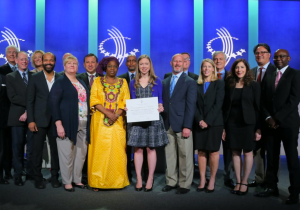2015
New Partnership To Strengthen Community Health Systems in Low- and Middle-Income Countries
by Ray Chambers
The Aspen Institute, USAID, the MDG Health Alliance, GSK, and Partners In Health Announce Partnership to Strengthen Health Systems in Low- and Middle-Income Countries
 During the Clinton Global Initiative 2015 Annual Meeting, a collaboration of multi-sector partners launched The Aspen Management Partnership for Health (AMP Health), a mechanism to provide in-country managerial and strategic support and expertise to Ministries of Health in an effort to strengthen community health systems and develop the next generation of health leaders in low-and-middle income countries. It is the first multi-sectoral partnership of its kind focused on strengthening community health systems through building leadership and management capacity in the Ministries of Health of low-and-middle income countries. The partnership is comprised of a diverse set of stakeholders, including private sector companies, nonprofits, donors, on-the-ground-implementers, and Ministries of Health.
During the Clinton Global Initiative 2015 Annual Meeting, a collaboration of multi-sector partners launched The Aspen Management Partnership for Health (AMP Health), a mechanism to provide in-country managerial and strategic support and expertise to Ministries of Health in an effort to strengthen community health systems and develop the next generation of health leaders in low-and-middle income countries. It is the first multi-sectoral partnership of its kind focused on strengthening community health systems through building leadership and management capacity in the Ministries of Health of low-and-middle income countries. The partnership is comprised of a diverse set of stakeholders, including private sector companies, nonprofits, donors, on-the-ground-implementers, and Ministries of Health.
Clinton Foundation Vice Chair Chelsea Clinton announced this CGI Commitment to Action during the 2015 Annual Meeting. “The Aspen Institute, in partnership with Partners in Health, GlaxoSmithKline, MDG Health Alliance and USAID will provide management, financial, and strategic expertise to Ministries of Health,” said Chelsea Clinton. “In addition to establishing mentor networks and cross-country convenings, the partners will recruit, train, and deploy in-country management professionals to work side-by-side with Ministries of Health on high-priority community health projects, ultimately strengthening health systems.”
“The Aspen Institute’s mission is to develop values-based leadership, which is critical to community health systems facing grave challenges like Ebola and other diseases” said Institute President and CEO, Walter Isaacson. “AMP Health’s innovative partnership will improve the health and well-being of many living in the hardest to reach parts of the world.”
AMP Health was developed by the U.S. Agency for International Development’s Center for Accelerating Innovation and Impact and the MDG Health Alliance. Initial partners will include GSK, Harvard School of Public Health, McCann Health, and Partners in Health.
Following the devastating human and financial costs of the West African Ebola crisis, global leaders have emphasized that stronger health delivery systems are needed to recover from Ebola, to continue the fight against the top killers of children and mothers, to prepare for future epidemics, and to build capacity to handle the growing burden of non-communicable diseases.
As part of the program, embedded “Management Partners” with significant business and management experience will work closely with select ministry staff on catalytic community health initiatives. These ministry teams will be supported by an engaged global and local mentor network and have access to needs-based training. This training will include best-in-class curriculum from various partners, including through Partners In Health’s new University of Global Health Equity (UGHE) in Rwanda. Said Dr. Paul Farmer, Co-Founder and Chief Strategist of Partners In Health, “You can’t have public health without working with the public sector. Working in close partnership with Ministries of Health is essential to strengthening health systems—as is building local capacity, as we’re doing with the UGHE.”
The post-Ebola recovery in Sierra Leone, for example, includes a two-year recovery plan to rebuild the country’s health system and restore health services. Samuel Kargbo, Director of Health Systems, Policy, Planning, and Information in the Ministry of Health and Sanitation said, “Partnering with AMP Health would allow us to strengthen and accelerate these efforts by bringing much needed management and leadership capacity to our team.”
“Key interventions in community health systems could prevent up to 3 million deaths per year in sub-Saharan Africa” said Jeff Walker, Vice-Chair of the MDG Health Alliance, a special initiative of the United Nations that brings philanthropists and private sector leaders together to achieve the health Millennium Development Goals. “We are privileged to be part of this collaboration – both in business and philanthropy, it is evident that strong collaborations can create systemic change.”
AMP Health will also leverage expertise from a growing set of private sector partners. “Resilient health systems are the backbone of thriving societies,” said Sir Andrew Witty, CEO of GSK. “Through this partnership, GSK can bring its experiences and expertise to bear in helping strengthen health systems so they are equipped to manage everyday challenges as well as pre-empt and manage crises. We are delighted to be involved with this partnership from the outset and look forward to working with other organizations as the collaboration grows.”
“This unique multi-sector approach is an example of USAID’s emphasis on bringing collaborative approaches to our global health work around the world” said Dr. Ariel Pablos-Méndez, Assistant Administrator for Global Health and Child and Maternal Survival Coordinator at USAID. “It’s the collective action of programs like AMP Health that are needed to strengthen health systems and accelerate achievement of our goal to end preventable child and maternal deaths.”

